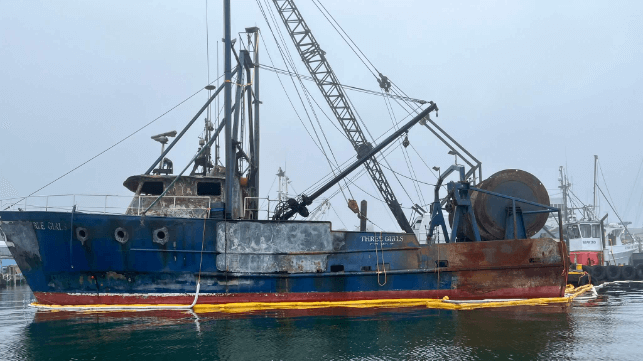NTSB: Hydraulic Leak Caused Loss of Fishing Vessel Off Maine

The fire that destroyed the fishing vessel Three Girls off the coast of Maine in 2024 was likely caused by a spray of hydraulic oil, according to an investigation by the NTSB. The crew all abandoned ship and survived, in no small part because of timely and creative action by the vessel's master.
On August 11, the Three Girls was under way in the Gulf of Maine on a routine trip, and had five crewmembers and a fishery observer aboard. At about 2050 hours, the crew was hauling in nets and running all hydraulic systems at full power when the captain smelled something burning. He checked the engine room and encountered thick smoke - so thick that he could not clearly see where the fire was coming from. He determined that the blaze was too serious to fight, and he ordered the crew to prepare to abandon ship.
The master went to the wheelhouse to make a mayday call. Though the smoke was chokingly thick, he managed to get the call out, and the Coast Guard launched response assets. Before leaving, the master also shut down the winch engine - but could not shut off the main engine or generator (which was still powering the vent fans for the engine room) because there were no remote shutoffs on board. The vessel also lacked ventilation louvers or remote shutoffs for the ventilation fans to cut off oxygen to the fire.
To prepare to abandon ship, the mate ran to the accommodations area to retrieve the vessel's immersion suits. He retrieved five suits before smoke and fire forced him out of the space, leaving the crew one suit short. The master instructed the rest of the crew to don the available suits, and he volunteered to abandon ship without wearing one.
Instead, the crew inflated the life raft on deck, the master climbed in, and the crew pushed the raft down the trawler's stern ramp with the master in it - allowing him to stay dry. The rest of the crew followed down the ramp and into the water, then climbed into the life raft.
As a Coast Guard rescue helicopter approached, the master set off two rocket flares to ensure that the raft was spotted quickly. He turned down an assist from a Good Samaritan fishing vessel, concerned that a transfer from the raft to the hard-hulled fishing boat would be risky for his crew in choppy conditions, and waited for a Coast Guard rescue boat from the cutter William Chadwick. The cutter took all survivors aboard at 2314 hours, and no injuries were reported.
The fire burned through the night, destroying most of the engine room, accommodations and wheelhouse. The vessel stayed afloat, but the blaze was hot enough to warp the bulkheads and deckplates. Three Girls was declared a total loss at a value of $1.3 million.

Courtesy NTSB

that matters most
Get the latest maritime news delivered to your inbox daily.
The Coast Guard, the Bureau of Alcohol, Tobacco and Firearms and the NTSB inspected the boat after the fire. They found evidence that the blaze had been hottest near the hydraulic return oil filter housing, next to the winch engine. Based on the fire pattern, they believed that the likely cause was a spray of hydraulic oil from the filter housing, a hydraulic hose fitting or hose segment. A fine high-pressure hydraulic oil spray could have reached uninsulated parts of the winch engine's exhaust system, igniting and then burning through other nearby flammable materials. Most serious engine room fires begin with a spray of fuel or oil onto hot exhaust components.
"After an engine room fire ignites, it is imperative to remove the sources of available fuel and ventilation to the fire to prevent it from spreading," NTSB concluded. “Vessel designers, builders, owners, and operators are encouraged to install, regularly test, and have emergency drills that incorporate remote shutoffs for all machinery within these spaces to ensure the machinery can be remotely stopped from outside the space where it is situated. Additionally, to prevent the reintroduction of oxygen to the space, vessel designers and owners should ensure that the ventilation, both natural and forced draft, can be completely and remotely secured to all engine rooms."
